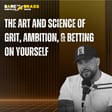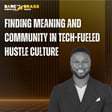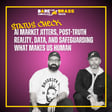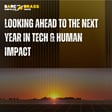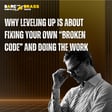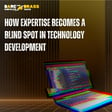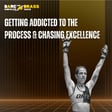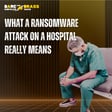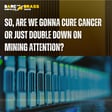Become a Creator today!Start creating today - Share your story with the world!
Start for free
00:00:00
00:00:01

A Biotech Innovation to Treat a Chronic Health Problem Impacting 2 Billion People
Hunter Grad, CEO and founder of Ameliogenix, joins the show to talk about developing mRNA immunotherapies for cardiovascular disease. George K and George A sit down with Hunter to discuss:
- How a procrastinated university project turned into a biotech startup tackling the leading cause of death worldwide
- The novel application of mRNA technology to permanently reduce cholesterol levels through targeting proteins within the body rather than viral diseases
- What it takes to bootstrap a biotech company in Ottawa, not Silicon Valley
- The brutal realities of fundraising in biotech versus software startups, and why pivoting isn't always an option when lives are on the line
- Clearing up the myths and misinformation around mRNA technology, from how it actually works to addressing fertility concerns
- The role of machine learning in accelerating biotech research and drug discovery, and why quality data matters more than flashy AI hype
Hunter breaks down complex immunology concepts into digestible explanations while sharing the raw challenges of being a young founder in a traditionally academic-led industry. This episode explores innovation at the intersection of technology and medicine, the importance of rigorous science over buzzwords, and what it means to swing for the fences on a problem that affects 2 billion people worldwide.
Mentioned:
Using AI, MIT researchers identify a new class of antibiotic candidates
Transcript
Introduction of Hunter Grad, CEO of Amelio Genics
00:00:00
Speaker
We actually have a trio of therapies in our pipeline right now. and We have three separate targets that are well validated ah in scientific studies, but no one has targeted them the way that we're targeting them with um mRNA therapies. mRNA therapies have been used against like viral diseases like COVID, which popularized it, um but they have been in research and development since the late 90s.
00:00:22
Speaker
What we're doing, though, is we're using ah mRNA technology to target proteins and targets within the body. That's a novel application. No one else is doing that in the cardiovascular disease industry.
00:00:33
Speaker
And not only are we using that as a novel, the ah mRNA ah technology with a novel application, we're doing it against three different targets at the same time. So what we're planning to do is use each of our therapies in conjunction with each other to provide a triplicate effect of cardiovascular disease prevention through ahdl cholesterol reduction.
Hunter's Path as a Young Biotech Entrepreneur
00:01:06
Speaker
yo it's bare knuckles and brass tacks this is the tech podcast about humans i'm george k and i'm george day we have something very new for the show we have hunter grad who is the founder and ceo at amelio genics which is a biotech startup looking at developing vaccines to treat cardiovascular disease by targeting cholesterol So that is a whole new category of tech that we've never covered before.
00:01:34
Speaker
And i just found this conversation fascinating. yeah I mean, I really liked it because, you know, again, as someone who is barely like I was undergrad, he's like 27 years old.
00:01:45
Speaker
Um, and with the way his brain's wired, like he's not, ah not a PhD. He's not a guy with 20 or 30 years in the industry. He doesn't have the networks, doesn't have the funding. He is, uh, literally a dude with an idea and, and, and undeniable desire to achieve it.
00:02:02
Speaker
And he is like just failing upward and bashing his way through every obstacle imaginable. So it's, yes, the the vaccine is amazing. The technology is amazing. The science part of the story is amazing. But what captivated me was just more someone in this economy through everything that's happening right now in the last five years, especially around vaccines, decided I'm going to design a vaccine with a huge big picture idea and I'm going to put my life on the line basically, potentially hamper my career progress at the critical years I need to, to actually take a
Innovation Post-Theranos: Risk-Taking in Biotech
00:02:35
Speaker
shot.
00:02:35
Speaker
That kind of courage, I think that's that's the fun part about this. Yeah, 100% we get into a little bit of that founder journey. I think you're right. It's very ah clear from Hunter's demeanor that he is mission driven and he's motivated by some level of altruism to do something big.
00:02:54
Speaker
But also like, I think Biotech is in desperate need of that kind of risk taking and just a push for innovation generally. i think the Theranos debacle chilled a lot of that. And we've seen we've seen in software, at least and far younger people come up with far stupider shit.
00:03:13
Speaker
and like still be able to push it forward. Right. And as we have said on the, on the show before, we're also here for kind of a diversity of thought, like what's outside the Valley, what's outside Tel Aviv, what's outside the sort of typical centers of
Podcast's New Focus: Tech Impact Beyond Cyber
00:03:27
Speaker
startup land. And this guy explains coming out of the Ottawa scene, which I'm also intrigued to learn about, but the incubator process and yeah, it's just new people, new ideas, new approaches. And,
00:03:39
Speaker
ah For the benefit of our listeners, we only touch on machine learning at the very end of the episode. So you're welcome for that. Without further ado, let's turn it over to Hunter.
00:03:58
Speaker
Hunter Grad, welcome to the show. Thank you. Really happy to be here. I think this is a great opportunity to showcase what we've been working on at A Million Gen
00:04:07
Speaker
That's really
Hunter's Journey from University to CEO
00:04:08
Speaker
cool. um You know, I really am excited for you to be on the show. um We've got a whole like kind of pivot we've been doing for this year or this season, I should say specifically. And we're really trying to find like cool people who are are using technology in different applications. And so your your story and and what your company is doing is one thing. And then the fact that you are you know, straight out of university and basically going balls to the wall on this founder thing with the kind of psychosis that a Silicon Valley kid would do, but you live in Ottawa.
00:04:41
Speaker
I mean, that's, I think that's a notable thing, but you know I'm not going to steal your own introduction. why don't you high level just explain who you are and what your company is, just the top level points because we got a big interview to go into.
00:04:52
Speaker
Sure. and So I'm the CEO and founder of Emiliogenics, which is basically the future of heart disease treatment. So we're a Canadian biotech company that's developing m mRNA immunotherapies that rewire cholesterol metabolism to permanently reduce cholesterol levels.
00:05:11
Speaker
um I'll just explain a little bit about how I came up with this idea. Back in university, we had to do projects in an immunology course about certain diseases, like chronic illnesses.
00:05:23
Speaker
We had to learn about how they develop, what the current treatments are, and the future treatments are. I got stuck with cardiovascular disease because I procrastinated. That's the funniest thing about this whole journey is that it wasn't even meant to be in the first place, was that I wanted to choose something else and it was the final option because I had procrastinated too much.
00:05:42
Speaker
Anyway, I did what I had to do. I learned about it. And as i was learning about it, I learned about how significant of a problem it was in society when about 35% of adults worldwide have high cholesterol. It's about 2 billion people worldwide have high cholesterol. It's a leading cause of death.
00:05:57
Speaker
above all else. And so as I was learning this, I was learning about current treatments and how there's not there's nothing that's effective enough. You know, we've had the same drugs since the 80s, and we're not seeing a reduction in high cholesterol diagnoses or cardiovascular death. We're seeing an increase.
00:06:15
Speaker
So that's signal to me that there needed to be a change, there needed to be something new. And I decided that I was going to be the one to do that.
Challenges and Validation in Biotech Startup
00:06:23
Speaker
Wow, that's ah that's not light at all.
00:06:28
Speaker
um Okay, so i guess you kind of talked about what sparked the idea. um Really, before we kind of get into your founder journey, which I think I'm gonna tell the audience right now, um the company itself is really cool. The project is really cool. And like full disclosure, like Connor and I are actually like real life friends outside of all the cyber and all, we touch grass sometimes together, not in a weird way.
00:06:51
Speaker
But yeah, You know, let's talk about what's the unfair advantage you're building that others can't easily replicate can't easily replicate, excuse me. Right. So as I touched on, our therapies are mRNA immunotherapies.
00:07:05
Speaker
We actually have a trio of therapies in our pipeline right now. and We have three separate targets that are well-validated in scientific studies, but no one has targeted them the way that we're targeting them with um mRNA therapies. mRNA therapies have been used against like viral diseases like COVID, which popularized it.
00:07:23
Speaker
um But they have been in research and development since the late 90s. What we're doing, though, is we're using um mRNA technology to target proteins and targets within the body. That's a novel application.
00:07:35
Speaker
No one else is doing that in the cardiovascular disease industry. And not only are we using that as a novel, the ah mRNA ah technology with a novel application, we're doing it against three different targets at the same time.
00:07:49
Speaker
So what we're planning to do is use each of our therapies in conjunction with each other to provide a triplicate effect of cardiovascular disease prevention through LDL cholesterol reduction.
00:08:03
Speaker
So there's no one else in the industry that's developing a therapy quite like ours, especially against the number of targets that we're ah that we're focusing on. Nice.
Community Support and Bootstrapping Emiliogenics
00:08:14
Speaker
Someone who just came back with LDL levels that were less than optimal. I'm super excited about this.
00:08:21
Speaker
But ah we're going to get into m mRNA a little bit later because I think that is a very novel application, right? Most um ah lipid therapies are today either preventative or, I mean, well overweighted in the like post-cardiac problem treatment area rather than, you know,
00:08:43
Speaker
kind of an immunization effort. i'd say yeah I think that's the novel concept. But um let we'll get there. But first, let's also start um with you as a founder. So I always tell startups that it takes a lot of hubris to start something because you have to have this vision. You have to believe enough sometimes to the point of delusion that you've got something that no one else has and it's worth pursuing. No, you got to be an outright weirdo.
00:09:09
Speaker
say Yeah, you got to be ah you got to you got to be a weirdo. So it takes hubris to start and humility to just succeed, right? Because you're going get punched in the face a lot. Oh, a lot. i lot Yeah, and I and i ah borrow from the military to say, you know, no idea survives first contact with the market, right? There's always like, this is genius. And then you go out there and you're like, why doesn't anyone else get it? And, you know, part of that negotiation as a founder is figuring that out.
00:09:31
Speaker
So, Talk a little bit about, you know, the moment where you felt like this was an idea that's worth throwing your weight behind. Because as George said, you are on the younger side, which tends to be software technology, much less common in biotech startups. That tends to become...
00:09:56
Speaker
years of research, sometimes it's professors spinning out projects, you know, sometimes it's graduate students but spinning out projects. um So yeah, talk about what it's like to take that on and and bootstrapping, of course, which is ah is an entirely different debate. So let's just like dig into that a little bit, because I think we'll get to the technology, but I want to understand how you got here.
Resilience and Building Industry Connections
00:10:17
Speaker
Sure. So early validation. um We could talk about that. So back in university, like I said, I took that immunology class. That's where I first learned about it. I obviously did not know enough to start a company back then. um What I did was I did a ah thesis placement at the U Ottawa Heart Institute to try to learn as much as I could from experts in the industry.
00:10:40
Speaker
While I did not actually get to explore the area of therapeutic um treatments for cardiovascular disease, I got to learn the basic science of it. Um, when I wanted to learn more past my undergrad, I found that there weren't actually any master's programs available that would let me study this on my own.
00:10:59
Speaker
So what I did was I graduated and I kind of just set the idea aside, to be honest. I worked in orthopedic surgery research as a research coordinator, but in the back of my mind, there was always this idea that I actually had a good idea that I could move forward with.
00:11:13
Speaker
I went back to the people I had worked with at the Heart Institute asked them, I said, what do you think of my ideas? I presented them this this idea that of targeting specific proteins um to to treat cardiovascular disease using the immune system.
00:11:28
Speaker
This is something that some researchers had ah researchers had already touched on um with various other techniques, but not using mRNA vaccine technologies. and That was entirely novel. And so I went to all of the industry experts that I that i knew from my connections at the Heart Institute, as well as Carleton University.
00:11:45
Speaker
And I asked them to poke holes in my ideas. I went to them. I said, here's my idea. This what I'm trying to do. you know Ask me questions you know and until I feel like I've answered everything and I can move forward with this as an actual valid idea. Because you're right, I don't have 30 years of experience in the industry.
00:12:00
Speaker
I don't come from Sanofi or or Eli Lilly or any of these giants. you know ah You're right, I graduated from Carleton with an undergrad. um And then I basically decided that I was going to be the one to start a company.
00:12:12
Speaker
So the validation came from all of these experts, you asking me questions about it, trying to poke holes in my theory until I felt like I was confident enough in what I was going to do and how I was going to accomplish that goal that I, you know, started the company, started Mulegenics.
00:12:28
Speaker
Nice. And um how has it been to date in terms of fundraising, bootstrapping? Where are you in that journey? So, we yes, I did bootstrap the company. um It's pretty uncommon in biotech being such a capital-heavy industry. Yes, yes.
00:12:45
Speaker
That's ah on an understatement itself. But so usually when companies spin out of biotech, ah like incubators in the universities, they usually are pretty well connected with funding opportunities, grant opportunities, you network connections and all that. And I didn't have any of that.
00:13:05
Speaker
I barely had any connections. I had people I worked with at the lab and and the Heart Institute, and I had the head of ah Carlton Health Sciences. Those were my two connections, and that was it. So what I had to do was I had to ask them for contacts. I had to ask them who they knew.
00:13:20
Speaker
i had to go to networking events, and then I had to sign with an incubator. I knew that I needed an incubator because I needed i needed someone who had business knowledge. I got put in touch with an incubator here in Ottawa called Momentum Air, run by...
00:13:35
Speaker
Dr. Kammo from Spiderwar Technologies. She has been instrumental in helping EmilioGenX move forward as an incubator. She's helped ah put us in touch with Lassie Tay, who's performing our research. They're the ones that are um extending FedDev grants to us for research.
00:13:54
Speaker
um And then we've also run a friends and family round ah where we've secured about $25,000 in so far. Nice. in the and cash investments so far nice That's pretty awesome. And I mean, look, like, and, and you know if we're going to talk about the Ottawa community as well, I'd be remiss not to bring out Suzanne Grant, who's also um kind of helped you out as well.
00:14:17
Speaker
Absolutely. Yeah. and and and yeah it's And it's not, I'm not saying this for my own sake. I'm saying this because I do want to highlight the actual founder community in Ottawa and the Angel Network, Angel Investor Network that Suzanne's led.
00:14:30
Speaker
When I went from the Army into commercial life, um she was instrumental in kind of setting the groundwork and guiding me into success. ah She was also an ex-military SIGINT kind of person, same unit, same lineage. as's a whole like, we're all tied together six degrees.
00:14:47
Speaker
when I met Hunter, my first thought was you need to know these people. And I think like that kind of got your gears going as to like, this is what this is. And then you got into a lot of other programs based on your own efforts and your own research from there.
Motivational Advice and Commitment to Cardiovascular Disease
00:15:00
Speaker
And I think for a lot of founders, like that's kind of how it is. Like you'll make friends who like, like your idea and they kind of bring you into some circles and they show you some things. And I think like what I've noticed about you especially is you observe, you recognize, you track pattern, and then you kind of figure out how to apply it to yourself at a rate in a way that,
00:15:21
Speaker
I've seen people in their 30s or 40s with 10, 20 years in industry not be able to understand. And I think that's one of those things where, you know, I make the joke with you, like you're neurotypical weirdo, but the beauty of your tism is your mind has like figured out a way to just chart the path. Like you see with clarity that a lot of other people don't have.
00:15:42
Speaker
So I think, you know, part of what I really want to lean on before we go into like, you know, who are in your long-term vision is talking about resilience, right? And we talk on this show a lot about resilience.
00:15:53
Speaker
George has done industry-wide work around resilience and and and and building like the ability to to mentally go through what we go through. How did you, a guy with no tech network, with no background, with no friends who've had years and years of experience, where did you find the resilience basically like You're fucking eight mile, bro. Like, yes.
00:16:17
Speaker
How did you do it?
00:16:20
Speaker
Well, so it's a good story. um Actually, this this kind of plays into some advice I've gotten from mentors throughout the years. um You know, in the beginning, when I was younger, i always I knew I wanted to do something.
00:16:35
Speaker
big to help people. um i used to think I wanted to be a doctor and that was originally my and my goal actually through my undergrad. That obviously pivoted. um But I've always wanted to do something major to help society. So that's always been one of my main drivers with everything I do is I've always wanted that as a core part of my mission.
00:16:55
Speaker
um when Back when I was trying to figure out what I wanted to do with my life, i wasn't so certain about medicine anymore and my direction. um remember having a conversation with my late grandfather, actually, where he gave me a really, really key piece of advice.
00:17:09
Speaker
And it was that if you do what you love for work, you won't work a day in your life. um And so I took that as kind of instruction to, you know, only do what I wanted to do.
00:17:24
Speaker
you know, don't settle for, for, for ah for anything else. Don't settle for anything else besides exactly what I wanted to do in my life. And, um I have found that I have found what I wanted to do and I knew from an early stage before I even I'd even gotten to where I am now with my company I knew that what I wanted to do was develop a treatment for cardiovascular disease you know tackle one of the biggest causes of death worldwide that would you know allow me to have the reach That I wanted in terms of helping people I'm a big believer in like Alex Ramosi, right? I love the following that guy
00:17:56
Speaker
And he talks about how when you're on the way up, like in the theater, like theoretically, visually, you're the only one clapping for yourself, right?
00:18:07
Speaker
Like when you are when you are at the point that you are just starting out and you need like morally the most support from people, that is when you'll get the least support possible, right? So you have to figure out what do. You're on your own the most through the hardest part. Yeah, that that's what it is. so like that that kind of...
00:18:24
Speaker
That period where it's you in your apartment fucking selling mattresses at night, like that transition to where you are now and where you're going, that's the point that people never break through.
00:18:38
Speaker
The majority of people never break through that point. There's a million people with a million ideas, billions of ideas. but they never take it through that. And so that journey, you know, through the wormhole, if you will, that's kind of like what I'm trying to capture is like, what was it like sitting around trying to explain to your friends, trying to explain to your family, to people who aren't even scientific, who don't understand what it is you're trying to do, and you have to explain to them in a way that they don't think you're a moron or just crazy.
00:19:08
Speaker
Right. It takes grit. it takes It takes, I would say, an immense amount of grit. um how to develop the the grit. You know, I'm not a neuroscientist. I don't know exactly how one can go about developing that amount of grit.
00:19:21
Speaker
But what I know that it requires to do this, to go through this sort of journey, is an undying belief that you will be able to achieve what you set out to achieve. um You know, you're right. In the early stages, it's hard to explain to people what you're doing when you have such a far-fetched idea to many, as it may seem.
00:19:41
Speaker
um yeah it's kind of lonely. you You're right. You're the only one cheering for you you know in the audience in the early stages when you know you can't even fully describe what you're trying to do to people.
00:19:52
Speaker
you know Either they don't have the right background or you know they don't they just don't know what it is you're talking about. and and um you know That's not to say they can't understand. it you know the The time you spend studying what you're working on you know is is obviously not something that someone who's not interested in the field would do so when i try to explain to friends and family you know it's met with skepticism with lack of understanding you know they they try to support me you know they and many do i have many strong supporters now as they've seen me work through this journey um but in the early stages you have to keep yourself motivated you have to just you know try to find the light the end of the of the tunnel oftentimes it's pretty dark it's pretty dark in there but you know you just have to keep moving forward it's it's just grit is what it is
00:20:39
Speaker
Yeah, I think you have to really focus on the things you can control rather than the outcomes, right?
Adaptability in Biotech Startups
00:20:44
Speaker
If you went into the year thinking like, okay, by August, I'll have, you know, accomplished X, y and Z, it's really hard to to control that outcome, right? That's just hope and a prayer.
00:20:55
Speaker
But if you can say like, today, i am dedicated to talking to two industry experts, And out of those conversations, I will have validation and and and one more introduction.
00:21:08
Speaker
Those are things you can apply energy and effort to, which I i call leading indicators versus lagging indicators of success. And so I think that like really focusing on the controllables is maybe the best way through, really.
00:21:21
Speaker
That has been key. That has been key as well. And i remember earlier on in the journey, I would try to set these long-term goals for things like funding and research accomplishments and stuff like that. And I actually was looking back at all of those early goals I set you know, back a year, year and a half ago.
00:21:37
Speaker
And ah they weren't met the same way that expected them to be met. Timelines were different. You know, the goals changed over time. And, you know, trying to set such a rigid expectation for yourself with a given timeline, it could could lead a failure if you if you don't allow yourself to explore other opportunities and you know alternatives to reaching a goal.
00:21:56
Speaker
um For example, I had reached out to an industry connection um called Future Dynamic Medicine. um they're They're a local vaccine research company here in Ottawa.
00:22:08
Speaker
And this is back before I had grants for research. And I reached out to them because I knew they had a wet lab. I knew they had a lab that was built for vaccine research. And so I approached them um and I had a meeting with the former CEO of FDM.
00:22:24
Speaker
um And he really liked what I was working on. um And he had discussed the possibility of a lab partnership where I would get to work in their lab, you know, on my stuff for some sort of deal.
00:22:37
Speaker
I really needed that deal at the time. I thought that that was the the end all be all deal. I needed to get in the lab and was going to support my company's R&D. that's all That fell through. It didn't end up working out, um you know, for for various reasons.
00:22:50
Speaker
um And I felt like at that time, like a bit of a failure, I didn't know what to do. I didn't know how to keep moving forward with that because we needed the lab. Without the data, we don't get the funding. um But it was that actual, not that loss of that potential partnership that allowed me to explore other opportunities and other grants. i don't have to give up equity to work, to you know to get access to a lab, to do the research.
00:23:15
Speaker
What I can do instead is I can look for for grant opportunities. And um like my my incubator partnership has been really instrumental in securing grants. So we haven't actually been able to, i sorry, we haven't had to give up equity for any sort of partnership deals to get into a lab.
00:23:29
Speaker
Instead, you know, we're um engaging in academic partnerships. to to get lab work done based off of, ah you know, government grants. Yeah, that's a perfect example of yeah pivots that come in place. Like, is the challenge a challenge?
00:23:44
Speaker
Is the challenge an opportunity? Stuff like that.
00:23:51
Speaker
Hey listeners, we hope you're enjoying the start of season four with our new angle of attack looking outside just cyber to technologies broader human impacts. If there's a burning topic you think we should address, let us know.
00:24:04
Speaker
Is the AI hype really a bubble about to burst? What's with romance scams? Or maybe you're thinking about the impact on your kids or have questions about what the future job market looks like for them.
00:24:16
Speaker
Let us know what you'd like us to cover. Email us at contact at bareknucklespod.com. And now back to the interview.
Potential of mRNA Technology in Cardiovascular Treatments
00:24:28
Speaker
Well, you mentioned wet lab, so let's dig into the technology. When we say MRNA, and as you said, sat on the shelf for many years, like and no one did anything with it. And and then suddenly it sort of burst into the zeitgeist in 2019, I guess, more accurately into the popular imagination, the COVID-19 vaccine, which obviously is quite loaded.
00:24:50
Speaker
i don't want to spend too much time on that part of the science. I really want to dig into like the approach here, but Before we continue, let's talk a little bit about why you saw mRNA as like the new linchpin for cardiovascular treatment. Because again, as I'd said at the beginning of the show,
00:25:12
Speaker
immunology, like just the philosophy of it had not been applied to this to date. It has always been sort of symptomatic prevention and then treatment after a cardiac event or after maybe, you know, calcium deposits detected in the arteries to try and get on the prevention side.
00:25:31
Speaker
There's been a lot of advances in the number of things they can test in lipids. um But yeah, why mRNA? That's a good question. That's totally fair. So back during COVID, which was before i had started amelogenics,
00:25:46
Speaker
um I was reading basically every paper that came out about the vaccines. you know There were so many different types of vaccines that were peptide-based, that were inactivated. And then there were the m mRNA vaccines, the ones that were popular, the um the the Pfizer and Moderna vaccines.
00:26:03
Speaker
And when looking at the performance of those compared to the other, you know, the the traditional vaccine formats, you know, yeah it was quite obvious that they performed at a higher level.
00:26:15
Speaker
um Now, what I was looking for wasn't just you know I wasn't trying to have a virus-like response from the immune system against being targets so our targets in the body.
00:26:28
Speaker
you know there aren't there's no There's no cellular level infection going on, so we don't need certain immune cells to be activated. What I found was that the mRNA vaccines actually had a higher antibody production type response from cells, and that's what I was looking for.
00:26:45
Speaker
So um I don't know if it's, you know, in your preliminary research before this, um if you found out about a company called Afiris out in Europe, they're creating actually a peptide based vaccine against a similar target as we are now in the the COVID research papers, the COVID vaccine research papers.
00:27:06
Speaker
and um It was found that peptide vaccines leads to a higher like cytotoxic cell response from the immune system, which is which makes sense. you know You're trying to you know quell a ah viral infection, um and you need cytotoxic cell response to you know kill infected cells.
00:27:23
Speaker
um Now, we don't want that. We don't need that. If we were to use the peptide vaccine, we would see some sort of like side effects, you know, offhand, ah you know, and inflammation or inflammatory responses. And, you know, inflammatory responses are a key component of cardiovascular disease, especially in plaque formation.
00:27:43
Speaker
So we're trying our best to avoid that. So when I was learning about the specific immune response that's stimulated by um mRNA vaccines compared to, say, peptide vaccines or like a VLP, um you know, we found that ah the antibody production response was significantly higher in mRNA vaccines.
00:28:03
Speaker
That's what we were looking for. So that's why I chose that technology. Nice.
00:28:09
Speaker
Yeah. So, I mean, I just want to say, though, like the... we think, I think we need to dispel some things, right? Where there has been a lot of lies and a lot of myths about mRNAs.
00:28:23
Speaker
And, um you know, like I'm up in Canada and, and, I see this stuff in the news all the time. And, you know, I can't imagine you guys, well, actually Hunter's with me and up in Ottawa with George. I can't imagine how much indoctrination, like it just hits you like a wave every day.
00:28:39
Speaker
And and yeah like full disclosure, like George has kids, George has kids of the vaccine getting age. So like ah it means a lot more to them. ah Let's talk about a couple of different false claims, and I want to get your opinion as a researcher as to why they're incorrect.
Debunking Myths about mRNA and DNA Alteration
00:28:55
Speaker
So first thing, let's talk about, there's the rumor about ah DNA alteration, right, which I'm sure you've you've heard where, you know, if you take an m mRNA vaccine, it's actually going to lead to, you know, your entire genetic code getting like rewired and then just just crazy shit.
00:29:12
Speaker
Why is that incorrect about using the um mRNA delivery vehicle for the medicine? For sure. So the essential dogma of biology is is how proteins get made, basically. So there's there's DNA, there's RNA, and then there's protein.
00:29:29
Speaker
So DNA, you can think of as the blueprint. you know it it hass It holds all of the information regarding how the body is supposed to work based on proteins. The um mRNA, whereas it's called messenger RNA, what the the M stands for, um that gets created from DNA being read and converted to mRNA.
00:29:49
Speaker
This is called transcription. And then you have a process of translation, which is where the mRNA gets converted to protein. So within the cell, this we're going into some basic biology here. So within the cell, you have the nucleus. That's where the DNA is stored.
00:30:03
Speaker
DNA doesn't leave the nucleus. mRNA can't enter the nucleus. um So the um mRNA that that's being injected into the body through these vaccines will enter the cell. It will be taken up by the cells.
00:30:14
Speaker
However, it does not have the ability to enter the nucleus. It has no impact on DNA ah transcription or DNA replication or or any of that process. um It's just a messenger from the blueprint so that the cell can use its cellular components.
00:30:32
Speaker
um to create proteins that the body uses. They're either building blocks, they're you know structural or functional, etc. Or they're an enzymatic. you know the The human body does not contain cellular machinery that's required to convert mRNA into DNA.
00:30:49
Speaker
um There is a component called reverse transcriptase. It's an enzyme um that viruses have. And... and ah That can convert ah ah mRNA you know to DNA, but we lack that.
00:31:03
Speaker
We have absolutely no ability to convert mRNA back into DNA in the human body. um So that sort of claim that it can do that is false. um What could partially be true is that the changes in the immune system in response to stimulation can lead to slight DNA changes.
00:31:24
Speaker
you know, um it it can lead to certain, you know certain cells respond a certain way and they may, you know, fine tune themselves to to respond more accurately or more specifically to a target after simulation.
00:31:37
Speaker
However, it's not the DNA changing monster that, you know, it's purported to be in some by some media outlets. It does not change your your DNA at ah at ah at a core level where your whole body changes.
Spread of Misinformation in Biotechnology
00:31:50
Speaker
Okay, so I want to give, just before I go to the next one, George, do have any thoughts on this? No, I mean, I think it's very easy to make this conflation, right?
00:32:01
Speaker
Because... ah How much sociology do we want to get into? That's why, George. Yeah. Okay. So, yeah, a lot of the conspiracy theories and other stuff, it has come up since time immemorial in every pandemic. It came up during the 1919 influenza pandemic. it It comes up all the time um because it is a mass event that creates uncertainty and in the vacuum of certainty people kind of inject whatever they want.
00:32:33
Speaker
I think the DNA thing in this case is a very easy leap in logic to make if you don't have a lot of ah understanding of biological mechanics because you just hear RNA, DNA, like it's super simple to make these assumptions.
00:32:48
Speaker
um But yes, to your point, getting down to the idea of like the messenger protein, which is quite temporary in cellular processes, being able to like change your entire genetic code just doesn't make any sense. I also think, you know, not to take it too lightly, but like when you have decades of science fiction from the Cold War and comic books, you know, like everything from Spider-Man getting bitten by a radioactive spider to whatever, like it has just popularized the idea that DNA is extremely malleable.
00:33:22
Speaker
um And it just is not, that's just not how nature works, but there you have it. That's correct. Yeah, DNA is not nearly as valuable. mRNA, like I said, is is the messenger. and and It's easily broken down. it It lasts maybe a couple hours to a couple days.
00:33:37
Speaker
you know Once it it does its job, it's broken down by the cell quite quickly. um DNA is very stable in comparison. It's pretty it's very well protected in the nucleus. I mean, this is well we're talking about billions of years of evolution.
00:33:50
Speaker
These processes weren't so specific, we wouldn't be where we are today.
Scientific Integrity vs Theranos Scandal
00:33:53
Speaker
um yes actually and so for a quick editing note i sent something back my earlier explanation about how viruses have reversed transcriptase if you could edit that to bacteria um have reverse transcriptase that's sorry i was i am i misspoke um we're not bacteria obviously so still that you know the rest of what i said applies can i can i point out that like how much i appreciate given that we're in the the era of like post theranos right you are actually honest enough as a person that when you do like realize like oh hey like i thought this thing this was incorrect or
00:34:29
Speaker
I appreciate you as a founder because you really you have to be carrying the flag and you have to be basically the juggernaut, a bull in China shop about anyone trying to say you're wrong about anything. right when you Founders, like i've I've met some Delulu ones that are like up in that 100 million plus thing and it's it's like trying to trot to a wall where just like that idea makes no sense, but cool. i yeah Less, you know?
00:34:52
Speaker
but um i think so Scientific integrity is what it is. um i I hate Therese actually. I was just watching the... yeah Well, it did a lot of damage, right? It did it. Every time we have one of these charlatans come through, it creates this chilling effect on much needed research. you know like After everyone you know got taken to the cleaners ah by that like essentially Ponzi scheme... I think suddenly there was probably a lot of Valley VCs that were like, look, let's just stay out of biotech because we clearly don't understand it. But that is that is a problem. Like we need innovation and that chilling effect is so damaging, which is – anyway, I have some feelings on that vis-a-vis AI, but we'll get into that in a second. And I just want to add your thoughts on the other ah their major –
00:35:40
Speaker
myth that I need to dispel with you because I'd like to get this on record as you can take this and then you can show people, like I talked about this before, the myth of infertility. Does mRNA cause infertility, Hunter?
00:35:54
Speaker
No, it does not. No. There were a number of studies that came out during COVID. And I read you know as many as i as I could have back then um about, i saw reports of delayed menstruation and supposed infertility claims.
00:36:09
Speaker
um When the body undergoes immune-related stress, it can affect fertility. But that's not because of mRNA. When you take any sort of vaccine, there's a spike in you know immune system and mentioned some activity And that can lead to slight changes in hormone levels across the body, which can lead to changes that in fertility levels at that time.
00:36:36
Speaker
What was found in the studies, especially the one relating to menstruation, and now I'm no OBGYN. I don't claim to be any sort of you know doctor. i don't have a doctor's degree or an MD.
00:36:47
Speaker
um But what was seen in the studies was that there was a delay on average about a day of menstruation than the entire cycle. um Now that was deemed to not be due to m mRNA as it was seen across all of the vaccinations.
00:37:04
Speaker
It was deemed to be from the immune stimulation from the vaccinations. It was also seen in people who were diagnosed with COVID. that it itself was responsible for changes in fertility because of changes in in cycles.
00:37:21
Speaker
Now, again, this all ties into, you it's not necessarily the COVID virus itself that's causing it, but it very well could be that the immune system being you know on a high alert and and you know strongly activated by COVID um was more responsible for those changes in fertility at that time.
00:37:38
Speaker
Now, what was seen was that following you know COVID becoming ah less significant of a problem and people taking fewer of the the follow-up shots was that this effect kind of disappeared.
00:37:51
Speaker
um Now, in people with the the the long COVID, which is you know not entirely well understood, but pretty well documented, is that that can slightly persist, that can slightly change the regularness of cycles and also in male fertility.
00:38:05
Speaker
um Again, not specifically because of the virus or m mRNA, but because of the constant and chronic immune activation, changing hormone levels across the body. Yeah, this is where nuance is the enemy of the internet, right? Because it's so much easier to just create clickbaity headlines.
00:38:26
Speaker
It's just like this, ah what's called, you know, it's called context collapse, you know, especially on social. Like you just take all of this context you gave us and you just like smash it into a post that's like, you know, 240 characters long or whatever with a headline picture and it's like screams.
00:38:44
Speaker
ah Yeah. Anyway, thank you for taking the time, Hunter, to to share that science with us. I do hear in the final turn... want to turn our attention a little bit to the future. So we have effectively gone the entire episode. It's probably the first in the season without saying AI.
00:39:02
Speaker
um And I'm actually going to not use that umbrella term. I'm going to hone in on machine learning. less um where Where do you see machine learning playing a role in m mRNA, trialing, researching?
00:39:19
Speaker
um i say that but as somebody who laments that like LLM chatbots and generative AI kind of take the spotlight and have and have taken again Funding away from narrower models that we have seen produce incredible medical outcomes. i think it was, I can't remember who it was last year, but at MIT where they discovered an entirely new class of antibiotics using, again, machine learning.
00:39:44
Speaker
What I would tell listeners is that if you dig into that article and their process, It still took many dozens of grad students pipetting samples to get the highest quality data to run the models on. It's not just like, let me query chat GPT and training sources of Reddit to discover new
Role of Machine Learning in Biotech
00:40:05
Speaker
antibiotics. That's not a thing.
00:40:06
Speaker
But I think that those models aren't getting as much attention as I would like, but I know that they are being used. So I guess I want to get your take here at the frontier of biotech, where you see machine learning playing an effective role.
00:40:18
Speaker
in in your research yeah you're right to say that it's it's you know it's definitely valuable in the uh early r&d stages um it can help you know validate your targets um you know based on data you feed it but you're right you know a machine learning model is only as accurate as the data that's been fed to it you know you're right you can't just you know code up something to to go and analyze what you're working on without having large data sets um So I see, you know, as data becomes bigger and bigger in biotech, we're seeing stronger models that can predict protein binding, you know, protein folding.
00:40:54
Speaker
You know, these these sorts of things are very, very critical to predicting the success of given therapies like um mRNA therapies. um you know we We use a variety of tools that are machine learning based that will analyze B cell receptor binding, you know protein folding, protein dynamics.
00:41:14
Speaker
we you know We use a ah wide array of these open source tools that can be found on the internet. um These have helped validate our prototypes, help us figure out which are most worthwhile for testing.
00:41:25
Speaker
um that we're now moving into actual lab-based testing for you know following these models. I can see it becoming a bigger, bigger player ah in the the coming few years.
00:41:36
Speaker
um and We're seeing a lot of biotech startups come out with you know hybrid programs where they're using some sort of machine learning model or you know some sort of AI. i'm ah you know I'm not an expert on AI by any means, but they're using sorts of AI tools to develop their therapies or they're even just developing AI based therapeutic discovery platforms. So I have a question on that though.
00:41:59
Speaker
Where are they, where are they acquiring and training that data from? Right? Because is it still just using years of traditional like journal published research or is this all like essentially data sets net new fresh data sets? Like where are you seeing that, that delta changing?
00:42:19
Speaker
That's a good question. um If I was a little closer to those niches, I'd probably have a little more information on that. um you know there's There's something to be said for not stealing scientists' data from their papers that they write you know in training in training your your models.
00:42:34
Speaker
um I'm sure that there are some companies out there that maybe doing that um there are also some that may be training on test data you know like like they make up they make up data with know given scenarios and they they train it on that to find specific outcomes and you know they they tested on their the data they've made they could try to come up with what they predict their model to to make um they can then you know apply to real real world scenarios by contracting with like um contact research organizations with their data sets and sometimes the like the large farmer organizations.
Conclusion and Call to Action
00:43:08
Speaker
Awesome. Well, thanks, Hunter. I tell you, i really appreciate coming out. This was really fun. It was really informative. um This is the level of like elevated discussion that George and I kind of dreamed of getting to.
00:43:21
Speaker
um So, you know, thanks for taking time with us. um But I think This is only going to be the first of of hopefully many times that we check in with you and see how your progress is. And we genuinely wish you luck, man. Like it, it takes brass balls to do what you're doing, dude.
00:43:36
Speaker
And I can swing for the fences, bud. We believe in you. Thank you. Appreciate it. I appreciate it. Yeah. Thank you for the time. We'll talk soon.
00:43:48
Speaker
If you like this conversation, share it with friends and subscribe wherever you get your podcasts for a weekly ballistic payload of snark, insights, and laughs. New episodes of Bare Knuckles and Brass Tacks drop every Monday.
00:44:01
Speaker
If you're already subscribed, thank you for your support and your swagger. Please consider leaving a rating or a review. that helps others find the show. We'll catch you next week, but until then, stay real.
